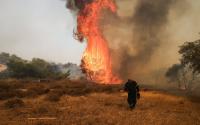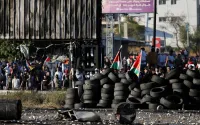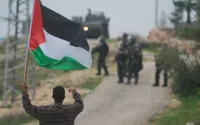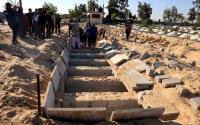The challenge to the U.S. occupation of Iraq has suddenly become serious. The media and politicians alike, across the world and inside the United States, are for the first time taking seriously the question, can the U.S. prevail in Iraq? And equally suddenly, the discussion is centering not around the question, can the U.S. bring "democracy" to Iraq, but around the question, what can the U.S. do to prevent the situation from turning into a fiasco for the U.S. itself - "another Vietnam" is the way it is usually phrased?The negatives are piling up. A continuing, but hitherto low-level, guerilla warfare in the central Sunni areas of the country, with 3-7 U.S. deaths a week, has escalated. After four Americans were ambushed, killed, mutilated, and dragged through the streets of Fallujah, the Marines decided on a major counterattack. The considerable firepower employed, including an attack on a mosque, has resulted in hundreds of Iraqi deaths, a veritable carnage according to the Iraqis, without (as of now) resulting in a U.S. military takeover of the city. The disproportionate U.S. response has managed to antagonize even the closest supporters of the U.S. Adnan Pachachi, former Iraqi foreign minister, member of the Iraqi Governing Council, and one of those the U.S. most counted on to support their efforts, has denounced the U.S. military attack on Fallujah as "completely unacceptable and illegal," calling it a form of "collective punishment."Meanwhile, the U.S. chose this very moment to challenge openly Muqtada al-Sadr, the radical young Shiite cleric who has been unremittingly hostile to the U.S. occupation. In the process, the U.S. stirred up the hornet's nest, and al-Sadr's people occupied the holy city of Najaf and other sites. The U.S. for the moment does not dare to try to enter Najaf. Furthermore, the U.S. succeeded in creating a very delicate situation for the more powerful, more moderate Grand Ayatollah Ali al-Sistani, whose followers are being attracted by al-Sadr's militance, especially given the U.S. actions. Al-Sistani is moving carefully, far too carefully for the taste of the U.S.And everywhere, the Shia-Sunni split has started to melt into the background amidst unified Iraqi patriotism. Even Kurds are beginning to talk this way. So, what had been merely guerilla action is starting to be resistance, which makes a real difference. The resistance forces not only hold a number of cities for the moment, but they have cut the road from Amman in Jordan to Baghdad, thus threatening the supply chain.In addition, various groups have taken to kidnapping non-Iraqis, in order to place meaningful pressure on the other countries that have been supplying troops and other support elements as part of the U.S.-led coalition. Popular support in these other countries had been weak from the beginning. And government support had already begun to erode even before the latest escalation. Now the U.S. has to spend much of its diplomatic energy trying to persuade coalition partners not to withdraw troops, or to send replacements for those which are leaving. The boat is leaking, at the very moment that the U.S. needs more troops, not less.Of course, the U.S. can send more troops itself - although not all that many, unless it reinstitutes the draft, which would be politically ruinous for the Bush administration. Some American politicians are calling loudly for more troops now. But others are talking, albeit less loudly, of the possibility of unilateral withdrawal. Bush would like to do neither, and hopes the whole discussion will go away. But that is scarcely possible, now that Bush's handling of the "terrorist threat" both before and immediately after 9/11 has become a matter of passionate national, televised debate.Many American and other political leaders are saying they want the United Nations and/or NATO to play a larger role. But while the U.S. leadership is repeating this mantra (hard for them to swallow, given their previous contempt for the U.N. and even NATO), the U.S. is moving very slowly on getting the needed resolutions. This is because it is not at all clear that it could get them. The price for such resolutions is high - ceding a lot of control in Iraq. And the U.S. administration is not yet ready to do this. So it wants what it has wanted from the beginning - substantive help from everyone else on exclusively U.S. terms. Not only are the U.N. and NATO not ready to do this; even the U.S.-appointed Iraqi Governing Council has become recalcitrant.U.S. elections are coming, and the situation is getting worse. And the magic date of June 30, when the U.S. promised to turn over sovereignty to the Iraqis is approaching. There seems to be no clear plan about what to do, even now. The U.S. is praying (and I mean praying) that somehow Lakhdar Brahimi will use his charm and intelligence and get the Iraqis (all of them) to agree on acceptable formulas. It's a very long shot. And even if the formulas are found, will the new Iraqi sovereign state have the military power to control anything? It's very hard to see how. But if the U.S. troops still rule the roost after July 1, the Iraqi sovereign power will appear to all Iraqis as a powerless puppet, and the U.S. military casualties will continue to mount.So, what will happen? If anyone on the U.S. side had a clear plan, as of now, perhaps they could stabilize the situation. But from Cheney to Rumsfeld, from Bremer to Gen. Abizaid, there seems to be little more than bewildered chiefs wandering in a fog. As for the Democrats in the U.S., they can't make up their mind whether they want to denounce the Bush administration for starting the war, or for not winning it. In any case, the best that Kerry has come up with is to turn the whole mess over to the U.N. (and maybe NATO as well) - in short, really the same mantra.There is the old wisdom that when you're in a deep hole, the first thing you must do is to stop digging. In order to stop digging, however, people have to admit that they were wrong to get into the hole in the first place - if not morally wrong, at the very least politically wrong. I frankly don't see anyone in Washington ready to do that yet. So it's easy to predict that the U.S. will continue to dig deeper.The day may come, sooner than the U.S. thinks, when it will decide to evacuate Iraq. It is worth remembering that, when the U.S. evacuated Saigon in 1975, it was faced with a unified enemy with tight control over its own side. The Vietcong ordered their soldiers not to shoot at a single U.S. very vulnerable helicopter that was evacuating. The Vietcong were ready instantly to establish order in Vietnam. In Iraq, there is no Vietcong. The Iraqis may well shoot at the departing helicopters.No one is really preparing in the United States for the post-Iraq era, which is likely to leave its harshest residue inside the United States. In the coming internal U.S. war of mutual recriminations, it is doubtful that anyone, on either side, will have a good word to say for George W. Bush.
Fernand Braudel Center, Binghamton University http://fbc.binghamton.edu/commentr.htm
Commentary No. 135, April 15, 2004






